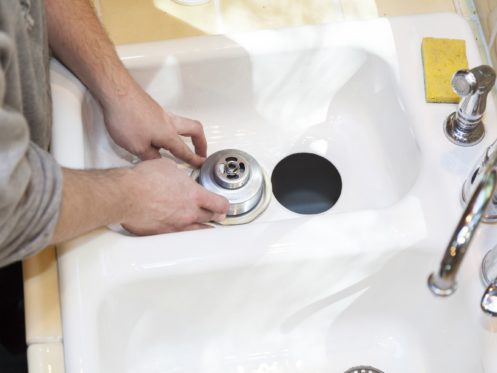No one wants to live in a home that smells like a rotten egg. But sometimes, you experience this smell, and in most cases, it results from gas leaks. However, if the smell is coming from the drains, there might be a few reasons that cause it.
You Haven’t Used the Drain for a Long Time
There is a trap in every drain line that prevents sewage gas from entering your home through the drains. If you don’t use the sink for a time, the water that’s supposed to be in the trap can dry up, which would let the unpleasant-smelling gas from the sewer enter your home. You can fix this issue by running water through the drain in most cases.
No Drain Trap
When you installed a new drain line, such as for a sink, bathtub, or other appliance, did you ensure that a suitable trap was also installed? If not, this is most likely the cause of the issue. If the drain trap is not there, there will be nothing to stop the bad smell from entering your home. To fix the issue, contact a professional plumber to install the drain trap, which could prevent the smell from entering your home.
Grease in the Drain
Among the most common causes of a rotten egg or moldy odor in a kitchen sink is grease or fat buildup in the drains. When grease is poured down a drain, it might solidify on the sidewalls. As it continues to degrade, the odor may re-enter your home. Therefore, avoid pouring grease down the drain.
If you suspect that this may be the issue, pour a few teaspoons of baking soda followed by vinegar down the drain. Then, pour a kettle of boiling water over it. The combination of baking soda and vinegar eats away at the debris in the drain. At the same time, the boiling water washes away the debris and sanitizes the drain, helping eliminate the smell.
Dirty Garbage Disposal
Food scraps might become lodged on the blades, causing a musty or putrid odor. Because of this, you should run water over the disposal for around 30 seconds after it stops making grinding sounds. This will aid in the removal of old food scraps. But if the problem has already occurred, try running ice cubes through it. This helps remove food that has adhered to the blades. Then, add orange or lemon pieces for a pleasant citrus aroma.
Clogged Plumbing Vent
When the plumbing vent is obstructed, sewage odors might enter the residence. If possible, examine the vent for obstructions such as a bird’s nest. The issue can be remedied by eliminating any obstructions from the plumbing vents. You can add shields to the vents to prevent future problems.
Contaminated Water
Your water could be why you smell the bad odor from the drains. Contamination from hydrogen sulfide gas can make water smell like rotten eggs. The gas can come from wells and is caused by a chemical reaction between soil and rocks. The gas is often a result of sulfur bacteria in the groundwater or issues with the plumbing system. If your water makes the drain smell like rotten eggs, there are several things you could do to eliminate the smell.
Replace or Remove the Magnesium Anode
Many water heaters contain a magnesium anode attached to a plug positioned on the water heater. The water has to be shut off, the pressure in the water heater must be released, and the plug must be unscrewed to remove it. Turn off the water, release the pressure from the water heater, and unscrew the plug to remove the magnesium anode. Make sure the hole is patched up. Taking out the anode could cut the water heater’s lifespan, though. Contact a professional plumber to consult if you can use another material instead of magnesium. Aluminum is often considered a great alternative. There is a possibility that a new anode could provide corrosion protection that leads to the production of hydrogen sulfide gas, which makes the water smell.
Disinfect the Water
Chlorine can eliminate sulfur bacteria. However, if not all germs are eliminated by chlorination, the issue could reoccur within a few weeks.
Increase Water Temperature
Keep the temperature of the water heater at 160 degrees Fahrenheit for several hours, and this will help destroy the sulfur bacteria. Then, flush the water to remove the dead bacteria, and the problem should be under control. However, increasing the temperature of the water heater can be dangerous. Therefore, talk to a professional who deals with water heaters first to be sure that you perform the treatment safely. If you’re not comfortable doing this yourself, a professional from Huft Home Services can help. After treatment, make sure the thermostat setting is lowered, and the water temperature is lowered to limit the risk of injury from scorching hot water and avoid unnecessary energy bills.
How to Prevent Rotten Egg Smell in Your Drains
Being proactive is the greatest course of action to take if you want to make sure you never have to experience the nauseating stench of rotten eggs again. Having preventative maintenance carried out by a trained professional will assist in keeping your drain free of any obstructions or prospective buildups, which will result in the absence of unpleasant odors.
However, you can prevent the smell from disturbing you again. First, wash your pets outside to prevent excessive hair and dander from going down the drain. You could also cover the open drains with mesh traps to keep soap and hair from the drain, preventing the bad odor. Always brush your hair before taking a bath. That way, you will prevent hair from going down the drain and clogging.
The best way to prevent unpleasant smells in your home is by keeping your pipes clean. Substances such as soap, water, grease, and coffee grounds often increase the likelihood of rotten egg smells. There are a few vital things that you can do to improve your drainage line. They include:
- Clean the lines more often using enzyme cleaners.
- Use a snake to remove clogs inside the pipes.
- Mix vinegar and soda to clean the drain. The reaction from the two makes a great solution for cleaning drain lines.
- Use cleaners to unblock sewer pipes and clogged wastewater drains.
At Huft Home services, we have been providing high-quality HVAC services to the residents of Sacramento and the surrounding area for many years. We are committed to ensuring that Sacramento residents stay safe and comfortable in their homes by providing them quality services whenever they want. We provide flexible financing options, and our work is always done meticulously.
Our technicians and plumbers are available 24/7, so contact us whenever you require our services in El Dorado, San Joaquin, Placer and Yolo Counties, and all of northern California. We service HVAC systems, traditional and tankless water heaters, electrical panels and wiring, and more. Contact us now or schedule an appointment online to get answers to your questions.




